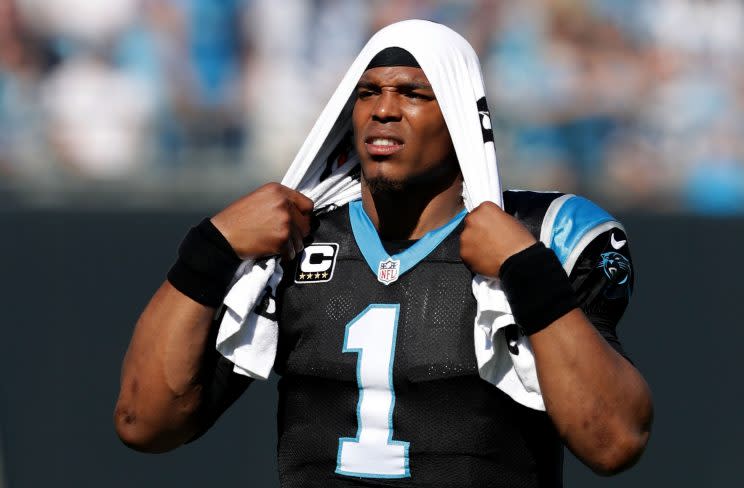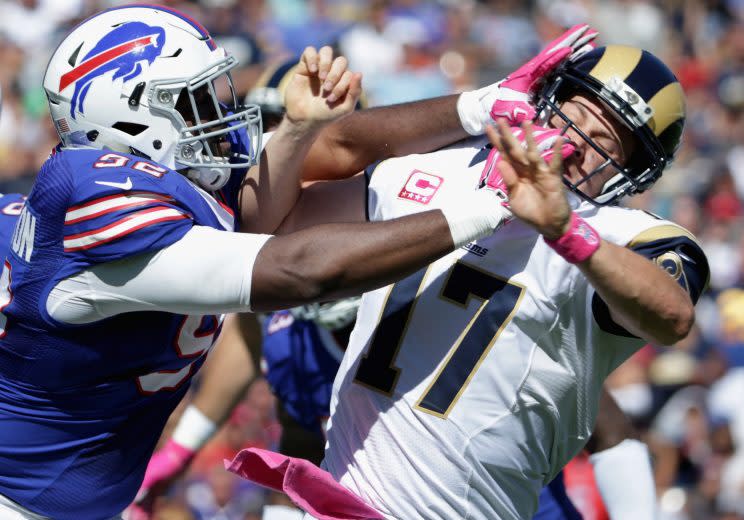Should there be a Cam Newton Rule involving instant replay to better protect QBs?
If the NFL really wants to protect the shield, it will do a better job protecting all of its quarterbacks. And there’s a simple step to take toward that end.
“Why don’t they review illegal hits on quarterbacks?” says former NFL official Jim Daopoulos. “Why not call it, then let it go to replay? They have the mechanism to do it.”
Adding a replay element to questionable hits on quarterbacks would liberate officials to throw a flag when in doubt, knowing the eyes in New York can correct them if they got it wrong.

This issue flared anew after Cam Newton suffered a hit from the Arizona Cardinals’ Calais Campbell on Sunday. The defender wasn’t penalized for the blow, but he was fined Wednesday $18,000. Newton complained about the hit after the game, and took his beef directly to commissioner Roger Goodell via a phone conversation on Tuesday.
Panthers coach Ron Rivera chimed in as well, telling reporters, “If there is an opportunity to go back and review things, I think as far as big hits on quarterbacks or hits to the helmet, I think that would be important,” Rivera said. “I think eventually it’s going to come to that, where, if there’s a questionable call you’re going to have to go to replay just to make sure.”
Could it happen? The league competition committee reviewed a proposal from the Baltimore Ravens this year which suggested replay be available for every personal foul. It didn’t pass a vote, despite “tremendous discussion,” according to league spokesman Brian McCarthy. The New England Patriots and Buffalo Bills have proposed similar changes.
But there is a way to expand replay in this very important area without letting video review become too intrusive overall.
Calais’ tackle on Newton was eerily similar to the 2008 hit by Kansas City’s Bernard Pollard on Tom Brady. That play ended the Patriots quarterback’s season, though it was deemed legal because Pollard’s movement was altered by a blocker. The rule states, “No defensive player who has an unrestricted path to the quarterback may hit him flagrantly in the area of the knee[s] or below when approaching in any direction.”
Newton commented that he didn’t feel he was sufficiently protected from week to week, and on Tuesday head of officiating Dean Blandino admitted a roughing the passer call should have been made. The blame for missed calls on hits such as those Newton suffered in Week 1 in Denver and again last weekend can’t fall completely on the referee, who is responsible for the quarterback but can’t see how he’s hit from every angle.
College football has a targeting rule and it subjects each infraction call to replay. It further empowers the replay booth “to ‘create’ a foul if he sees an obvious and egregious targeting action that the officials on the field miss.” It isn’t without controversy. The “What is targeting?” outrage on social media is the NCAA version of “What is a catch?” in the NFL.
Replay doesn’t solve all the problems it’s supposed to, and in some cases it can make a play less clear. But the hard truth is this: quarrels about in-game officiating do not make the game significantly less appealing, but injuries to quarterbacks do.
Of all the possible reasons for this season’s ratings drop in the NFL, from the national anthem protests to the competition of the presidential election season to the distraction of social media, the loss of top talent to injuries is the factor that should worry the NFL most. Stars like Newton getting hit in the head repeatedly will cause parents to wonder, “If they won’t protect the MVP, they sure won’t protect my son.” And in a more mercenary sense, the pull of fantasy tournaments and gambling is far less when the best player on the field isn’t in the lineup. The inconvenience of waiting three to five minutes for a booth review of a hit on a quarterback is nothing compared to the disappointment and concern when a top player is missing for weeks. And by the way: five to 10 minutes to evaluate a quarterback after a big hit is often necessary anyway.

There is debate over whether Newton is getting less protection than other quarterbacks. Blandino insisted he’s committed to ensuring “all of our quarterbacks are protected the same way under the rules.” According to ESPN, there hasn’t been an accepted roughing the passer penalty on Newton in two years, even though he’s the most contacted quarterback in the league. Drew Brees, in contrast, has drawn 10 roughing the passer calls.
It’s possible some of this is because of Newton’s size. Just as in basketball, where larger players like Shaquille O’Neal absorb more contact without whistles than relatively smaller superstars like Kobe Bryant, Newton and Ben Roethlisberger seem to endure major hits that don’t appear as flagrant because they don’t fall to the ground as easily upon impact.
“I don’t think he’s gotten the worst of it,” Daopaolous says. “It doesn’t just jump out that they’re going after Cam. I think they’re missing calls but they’re consistently missing calls.”
Whether Newton is more vulnerable or not, replay can help keep Blandino’s promise. In real time, Newton doesn’t seem as affected by a big hit; he usually pops right back up. But in slow-motion, the viciousness of a helmet-leading tackle is much more clear.
The NFL has done a good job of protecting the defenseless receiver, but there’s no one more defenseless on a given play than the man who is paid to stand in one place and look away from the impending physical threat. There is always a risk of overdoing it when hits are legislated severely, but the risk to the sport is far greater if enough isn’t done. Not everyone will agree with every call or every replay and there will be the usual complaints about the “wussification” of football. But anyone who cheers for a team, fantasy or real, will agree the NFL needs its quarterbacks staying healthy and playing longer.
More NFL on Yahoo Sports

